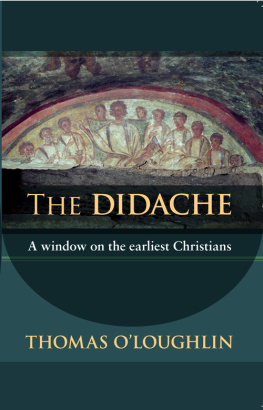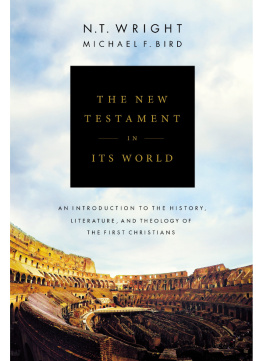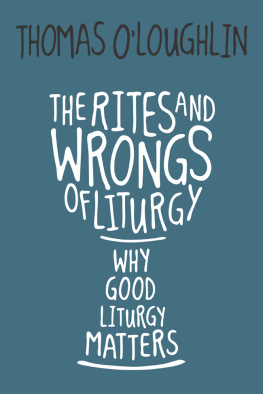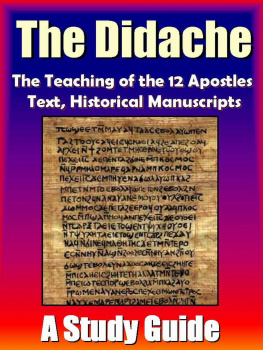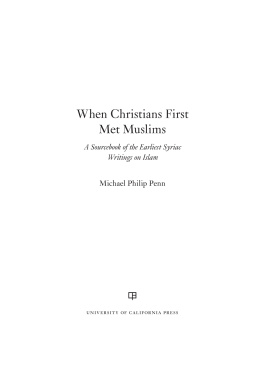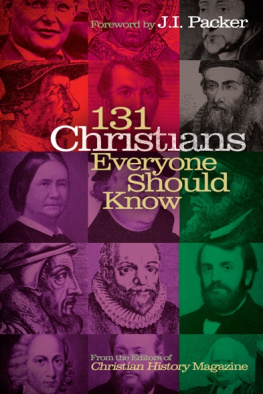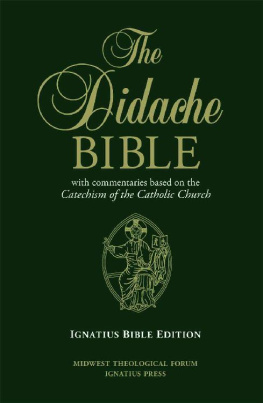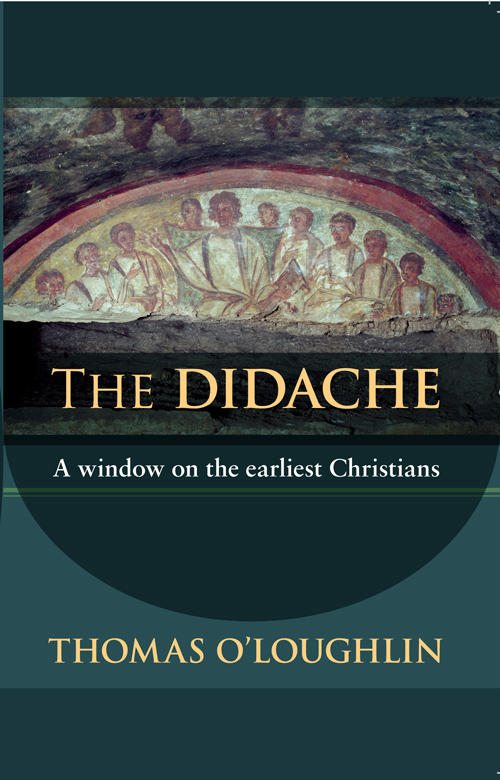
Thomas OLoughlin is Professor of Historical Theology in the University of Nottingham. His research explores how our understanding of Christian belief can be enriched by seeing how individual expressions of that faith, such as the Didache , can be located within the dynamic life of the communities that produced them. Tradition is not, therefore, a weight from the past that pulls a community backwards, but rather is the life of that community, constantly seeking to reinterpret its inheritance in the light of its current experience and hopes. The historical theologians task is, consequently, that of uncovering how a community inherited, lived, shaped and handed on its vision. OLoughlin has pursued this study in numerous books and articles over the past 20 years, covering topics relating to the early Church and the early Middle Ages; his passion is training graduate students in this often neglected field of research. He is the editor of the series Studia Traditionis Theologiae (Brepols), which is dedicated to the study of theology through the lens of tradition.

First published in Great Britain in 2010
Society for Promoting Christian Knowledge
36 Causton Street
London SW1P 4ST
www.spckpublishing.co.uk
Published in the United States by Baker Academic
a division of Baker Publishing Group
P.O. Box 6287, Grand Rapids, MI 49516-6287
www.bakeracademic.com
Copyright Thomas OLoughlin 2010
All rights reserved. No part of this book may be reproduced or transmitted in any form or by any means, electronic or mechanical, including photocopying, recording, or by any information storage and retrieval system, without permission in writing from the publishers.
SPCK and Baker Academic do not necessarily endorse the individual views contained in their publications.
Unless otherwise noted, Scripture quotations are the authors own translation.
Quotations marked [ RSV ] are from the Revised Standard Version of the Bible, copyright 1946, 1952 and 1971 by the Division of Christian Education of the National Council of the Churches of Christ in the USA. Used by permission. All rights reserved. NB The RSV Apocrypha was copyright 1957.
Quotations marked [ NRSV ] are from the New Revised Standard Version of the Bible, Anglicized Edition, copyright 1989, 1995 by the Division of Christian Education of the National Council of the Churches of Christ in the USA. Used by permission. All rights reserved.
British Library Cataloguing-in-Publication Data
A catalogue record for this book is available from the British Library
Library of Congress Cataloging-in-Publication Data is on file at the Library of Congress, Washington, D.C.
SPCK ISBN 9780281059539
eBook ISBN 9780281064939
Baker Academic ISBN 9780801045394
1 3 5 7 9 10 8 6 4 2
Typeset and eBook by Graphicraft Limited, Hong Kong
For
Anca and Andreas

Contents
It is now 25 years since I first used this little work, the Didache , as a core text in teaching. Over the years I have used it in almost every conceivable context where the teaching of theology takes place. I have used it with university undergraduates, in seminaries and convents, supervised dissertations devoted to it, used it at gatherings of ministers of various denominations and read it with groups of ordinary Christians in real communities. I have taken it into the pulpit, and most recently prepared a course upon it that will be delivered over the internet! Yet I am still fascinated by it and, more importantly, every group with whom I have worked through this text has found it fascinating. The Didache has an ability to change a leisurely class quietly studying Christian texts into a group eager to ask basic questions about Christianity and about its structures and practices, to spur them on to investigate what we know about early Christianity, and to empower them to look afresh at long-familiar texts and assumptions. I think this ability to make people sit up and start looking with a new energy at Christian origins comes from the texts unique combination of fami liarity people recognize so much of its contents from reading the Gospels or just from the practices they see in their churches and unfamiliarity this teaching is not presented in the way that it is found in the New Testaments texts nor do the practices conform with the deeply held assumptions of many churches. This mix of the well known with the startlingly different makes people sit up and look with new eyes both at the past and the present. It is this sense of the Didache as a text that can excite us that I have tried to convey in this book.
Over the years I have often been asked for a guide book to the Didache that would be more than a summary introduction, yet not a full-blown academic commentary (and there are several excellent ones), that would allow its reader to reread the Didache and draw more out of its text. I told many of those groups that I would write such a book but kept delaying putting pen to paper. Now, at last, here it is. If any of those many people with whom I have read the Didache over the years picks up this book, that person will find much that is familiar, but may also find a question they remember someone raising in class, or a comment first heard in a seminar. I have learned more about the text each time I have gone through it with a group; and I am thankful for all the discussions, questions, comments but, especially, my students enthusiasm.
Thomas OLoughlin
Nottingham
Over the years I have incurred numerous debts for help in understanding and appreciating the Didache , not just among my academic colleagues, but, more significantly, among students with whom I have read this text.
I would like to single out two students for special mention, Valerie Warren and Joy Powell, because they were the first to force me to search out how looking at the earliest churches could be a valuable part of the theological enterprise today. Over the years I can also recall very many conversations with colleagues on either the text as a whole or specific aspects of it. I hope they have as pleasant a recollection of the meal or the meeting in the pub when they suggested something, now incorporated here, as I have. I would also like to single out a few of my colleagues whose conversation over many years has helped me to clarify my views, especially Professors Robert Jewett, Sen Freyne, Justin Taylor and D. P. Davies, and Drs Kieran OMahony and the late Michael Maher, requiescat in pace Domini . I would also like to express my gratitude to Drs Frances Knight and Francisca Rumsey for acting as sounding boards for the book as it stands, and particularly to the latter for proofreading the text and saving me from more than one blunder! The positions taken, and the remaining imperfections, are, however, my own.
Working with SPCK has been a most pleasant experience: its staff were enthusiastic from the start, and have been the very model of generosity in their patience for the completed text. As ever, I have built up debts among many librarians, but Kathy Miles and Neil Smyth have been unfailing in their ready help.
Why the Didache ? Why bother to write a book about such a text, and why bother to read such a book? Let me try to answer these questions by way of an introduction to this book.

